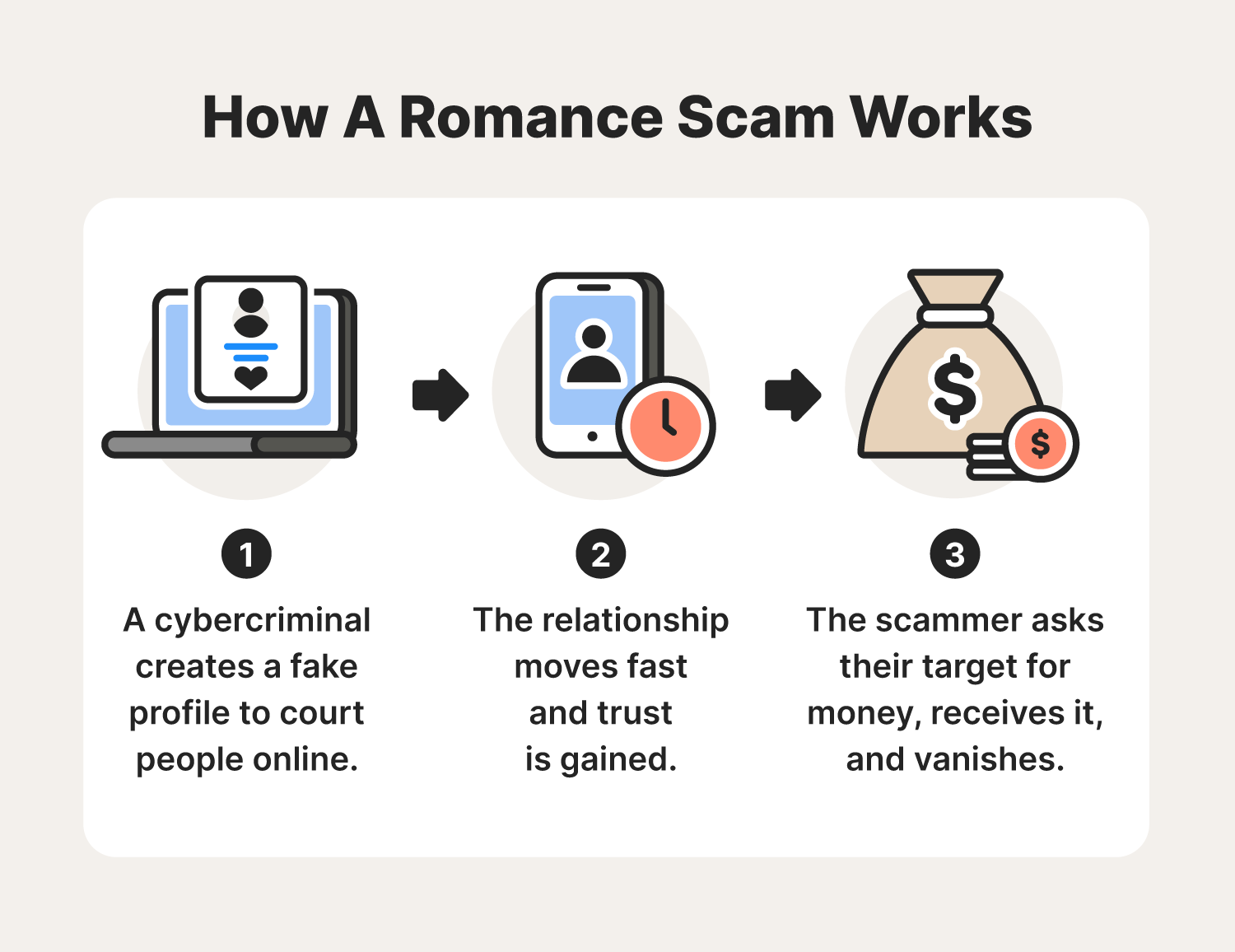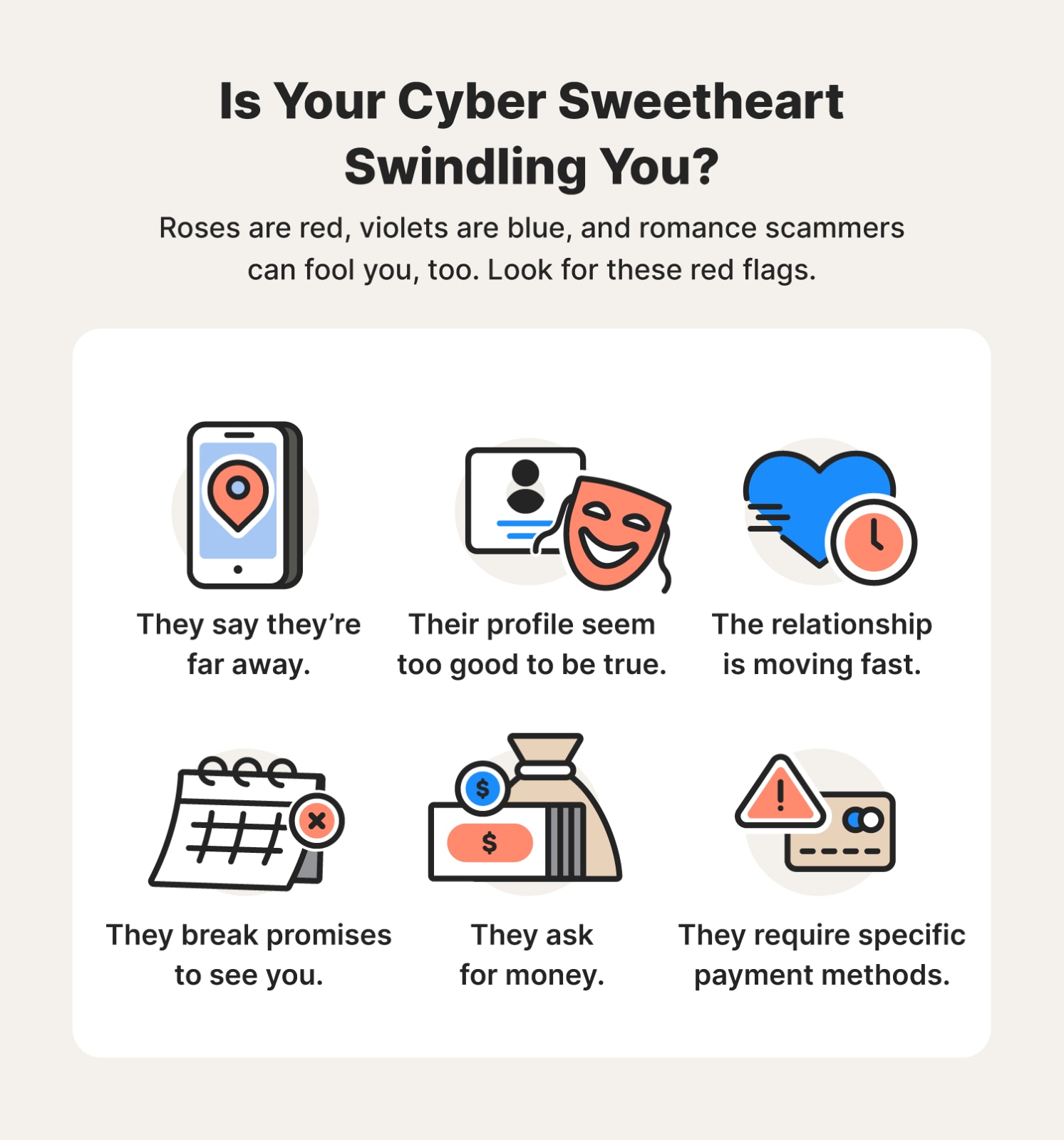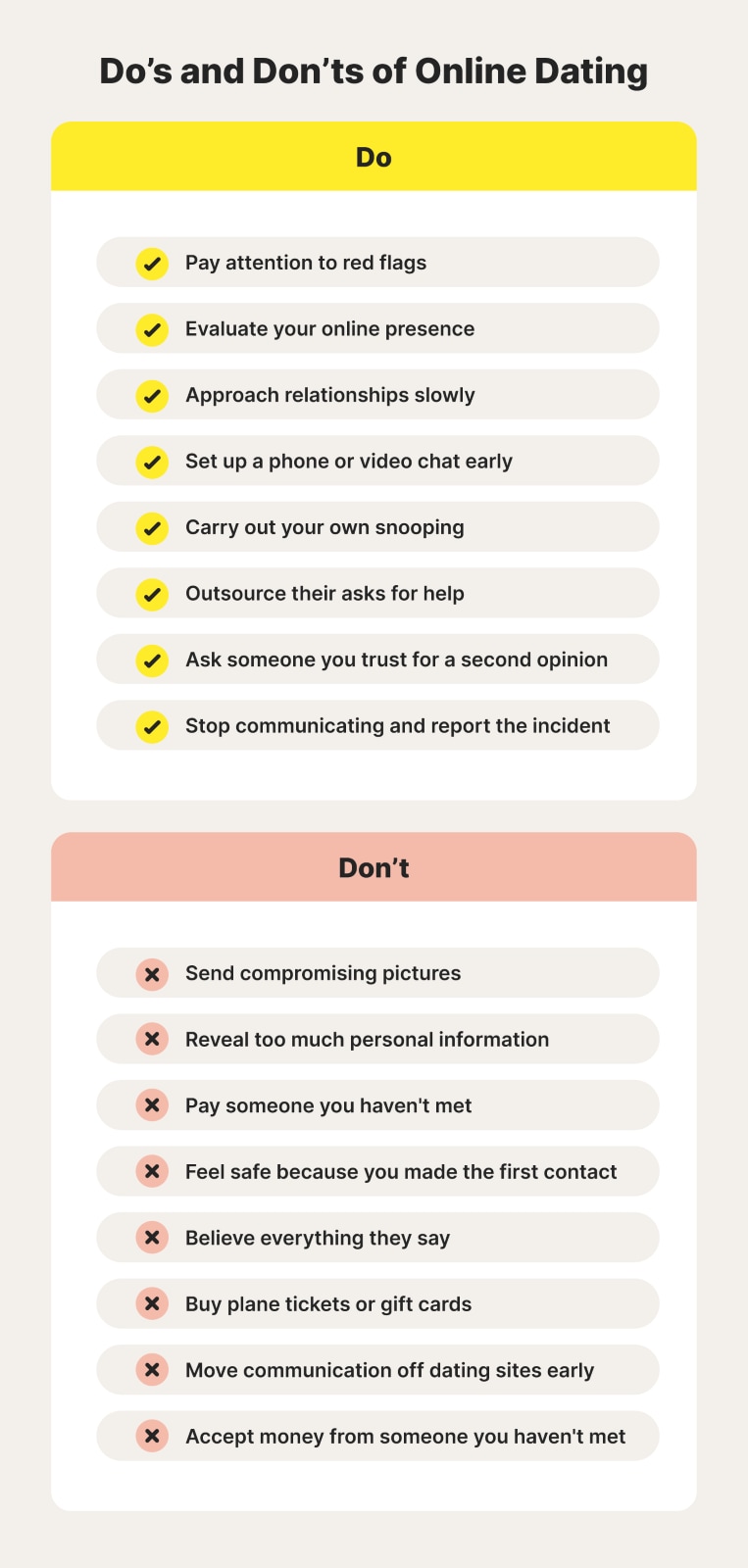Romance scams in 2024: What you need to know + online dating scam statistics

Romance scams are continually evolving. To learn more about them, pore over these online dating scam statistics, plus tips to help you stay safe in 2024.
In today's day and age, dating is no longer limited to the people you meet in person.
With more than 3 million people using dating apps in Australia, it’s never been easier to connect with others online.
Unfortunately, some people use these apps for more than letting digital sparks fly. Instead, some scammers use them to carry out romance scams.
According to Scamwatch reports of these dating and romance scoms have shown that in 2023 alone, over $33 million was lost to dating and romance scams.
We’ve rounded up 25 of those statistics to consider, as well as romance scammer avoidance pointers to ensure your love at first swipe or click is legit.
What is a romance scam (and what types are there)?
A romance scam, also known as an online dating scam, is when a person gets tricked into believing they’re in a romantic relationship with someone they met online, when in fact their other half is a cybercriminal using a fake identity to gain enough of their trust to ask — or blackmail — them for money.
Some of the most common internet dating scams include:
- Fake dating sites: Scam dating sites claim to be legitimate but are actually filled with scammers. These websites are created to mine your information.
- Photo scams: Scammers will convince their target to send their personal information in exchange for intimate photos.
- Military romance scams: The scammer will pose as a military member, likely deployed. They build trust by using military jargon and titles, then ask for money to cover military-related expenses, such as flights home.
- Intimate activity scams: The scammer connects with their target on multiple social media websites. Once they become closer, the scammer convinces them to undress and then threatens them with the recordings.
- Code verification scams: Scammers will send a fake verification code through email or text, posing to be a dating app or website. Once clicked on, it will ask for their personal information, including Tax File Number and credit cards.
- Inheritance scams: Scammers will make their target believe they need to get married in order to get their inheritance. In this case, they will ask them to help pay for something like airfare.
- Malware scams: Malware is also common on dating sites. In this case, the recipient will interact with a scammer who sends them a website that looks legitimate; however, it's a page that includes malware.
- Sugar daddy scams: In this type of romance scam, a scammer will pose as a wealthy individual looking to send money to a younger person in exchange for online companionship. Once they build your trust, they'll ask for an upfront fee or personal information before sending your allowance.
Now that you know the different types of romance scams circulating on the internet, let’s look at how they work.
How romance scams work

Oftentimes, a romance scammer starts on dating sites or apps. But scammers have increasingly started finding targets on social media, too.
After connecting with someone through a fake profile, the scammer will strike up a conversation and start building a relationship by regularly chatting with them. Once they start to trust the romance scammer and believe they have a truthful relationship, the cybercriminal will make up a story, ask them for money, and vanish.
Warning signs: Lies romance scammers tell

How can you identify a scammer? Well, you probably have a sense of what's considered normal behavior online. But it might be hard to see through an online dating scam when emotions are involved.
If you want to know how to tell if someone is scamming you online, here are some telltale signs a cybercriminal may be the one sweeping you off your feet.
They’re far, far away
One of the first giveaways of a romance scammer is their background. Fakers often pose as someone who is stationed abroad to create a reason for why they can't meet in person. Some common stories include:
- They’re working on an oil rig.
- They’re in the military and/or deployed overseas.
- They’re a doctor in an international organisation.
- They’re working on a construction project outside of Australia.
Since their story is so interesting, be sure to keep a close eye on any inconsistencies in it.
Their profile seems too good to be true
A legitimate dating profile usually has plenty of photos of the person in different situations, with one or two that show the person's whole body, not just part of their face. The individual might also include links to their Instagram or Facebook accounts.
In contrast, a dating profile might be fake if the person doesn't list any details. Or maybe their interests and hobbies almost exactly match yours — the similarities might be too good to be true.
The relationship moves fast
Online dating scam artists want to act fast before their targets catch on to their tactics. For this reason, they like to gain your trust right out of the gate. Some common approaches include:
- They profess their love to you surprisingly quickly.
- They ask you to marry them.
- They make a promise you will see each other.
- They ask to move communications off the dating site — you aren't seeing other people anyway, right?
Many online dating sites offer some safety features, and if you move your conversation to text messages or other chat options, you lose those features. Plus, the person will have your phone number, which could make it harder to cut communication.
In any event, it’s a good idea to pay attention to your conversations and consider the following red flags:
- The person’s messages look like they could be copy-and-pasted into any conversation.
- The conversation doesn't flow or make sense.
- Grammar and spelling are way off.
- They come up with different excuses when asked to video chat.
But they break promises to visit
Romance scammers want to keep their identities a secret. One way to keep you from questioning their identity is a promise to come visit.
They may even have you pay for plane tickets or other travel costs. But they'll cancel at the last minute, providing an elaborate reason for why they can't see you after all.
They claim they need money
If your online love interest asks you for money and you haven’t even met them, beware. A romance scammer may ask you to send money for things like:
- Travel expenses like a plane ticket or visa.
- Medical expenses like surgeries.
- Gambling debts.
- Family or personal emergencies.
And they usually have a sob story to back up their request.
An alternate money scam to watch for: They may send you money! This could rope you into a "money mule" scheme, whereby the scammer asks to deposit money into your bank account, distribute the funds to other people, or deliver packages. These requests could be tied to money laundering.
And they ask for specific payment methods
Be cautious if your cyber sweetheart asks you to send them money via:
- Wire transfer
- Preloaded gift cards
- A newly established bank account in your name
These are ways to get cash quickly while remaining anonymous. Plus, the transactions are hard to reverse. Once you send a little bit of money, they might even ask for more. If you say no, their messages may get desperate and aggressive.
10 tips to avoid romance scammers and protect yourself

Online dating site scams often end with people losing money and, in some cases, even being pulled into criminal activity. Besides the financial costs, there may be emotional costs, too. You may feel heartbroken, depressed, or embarrassed after someone you trusted scammed you.
That's why it's important to know how to outsmart a romance scammer and how to act fast if you think you’ve been scammed.
1. Be aware of the warning signs
Simply knowing how a romance scammer operates can help you identify and avoid one. Remember some of the red flags and lies online romance scammers tell:
- They’re far, far away.
- Their profile seems too good to be true.
- The relationship moves fast.
- They break promises to visit.
- They claim they need money.
- They ask for specific payment methods.
2. Evaluate your online presence
A few basic cybersecurity best practices can help protect you against internet scams. The more you share, the more dating site scammers know about you — and know how to lure you.
For this reason, consider keeping your online dating profiles anonymous by using different usernames on sites or even different emails to protect your privacy. Also, be careful what you make public on social media.
3. Approach online relationships slowly
The internet can be an incredible place for community, developing friendships, and sometimes even relationships. But it’s always important to take these relationships slowly, vet your new companions thoroughly, and be wary if answers don’t add up.
4. Set up a phone or video chat early
Seeing someone’s face can be a surefire way to determine whether they’re real or fake. For this reason, set up a phone or video chat early on in your communications with an online love interest. If they dodge the opportunity, they may be a romance scammer.
5. Don’t send compromising pictures
It's important to protect yourself online, so never send compromising photos or videos of yourself to someone, especially if you haven’t met them in person. These could be used as blackmail later.
6. Do your own snooping, like a reverse image search
In the age of social media and online dating, everyone has a digital presence waiting to be viewed. Do your homework on your cyber sweetheart by viewing their social media profiles. If their profile is bare or they have no connections, take it a step further with a reverse image search to see if their photos are on other sites. To do this:
- Right click an image of the person.
- Click “Copy.”
- Visit images.google.com and paste the image.
Google will show you the websites where the image appears online. If it shows up on a stock photo site or seems to belong to someone else entirely, then it could be part of a scam.
7. Never pay someone you haven’t met, especially someone online
Don't give out your financial information, top off a cash reload card, or send gifts or money to someone you haven't met face to face. Never wire money to a stranger or pay anyone with gift cards.
8. If they ask you for help, refer them elsewhere
Especially if your other cyber half is located outside of tAustralia., be sure to refer them to the Australian embassy within the country they’re in if they ask for help or money. It’s a reasonable response, since authorities would be able to provide better help, especially if you just met them.
9. Ask someone you trust for a second opinion
When your emotions run deeply with someone, it’s hard to face the reality that they’re not who you think they are. If you ever have an inkling that you’re caught up in an online dating scam, step back and ask a trusted friend or family member to give a second opinion about your relationship. They may see some warning signs of a romance scammer you didn’t.
10. Stop communicating and report the incident
If you’re suspicious or sure that you’re being scammed, cut off communication immediately and report the activity. Always consider the possibility of it being a scam, even if you contacted them first.
How to report an online dating scam
It may be nearly impossible to recover money after you've been scammed. But reporting these incidents helps federal investigators look for commonalities and may help lead them to perpetrators.
For these reasons, take the following steps if you suspect you’ve been scammed:
- Contact your bank right away if you’ve sent a romance scammer money.
- Collect any records you have of your online relationship, including conversations and transactions.
- File a police report.
- Report the incident to:
- Scamwatch
- The dating site if the scam started there
2023 dating scam statistics and trends
According to Scamwatch, over $33 million was reportedly lost to dating and romance scams in 2023 with over 3,400 reports placed. That’s a median of almost $10,000 lost per person!
Those within the 55 to 64 years age group reportedly lost the most money from dating and romance scams, over $10.2 million in 2023.
Following that, those in 65+ age group had lost over $7.5 million. The top delivery method for these scams were reported as social networking where over $14.6 million was lost, with mobile applications coming in second with just over $8 million lost.
The unfortunate truth is that too many people have been part of a love story that never ends happily ever after. Some of the proof is in these online dating scam statistics.
Falling in love can be great. But before you let someone steal your heart online, keep these romance scam warning signs and online dating pointers top of mind.
After all, you don’t want your love story to end in a cybercrime — everyone deserves a happily ever after.

Editorial note: Our articles provide educational information for you. Our offerings may not cover or protect against every type of crime, fraud, or threat we write about. Our goal is to increase awareness about Cyber Safety. Please review complete Terms during enrollment or setup. Remember that no one can prevent all identity theft or cybercrime, and that LifeLock does not monitor all transactions at all businesses. The Norton and LifeLock brands are part of Gen Digital Inc.





Want more?
Follow us for all the latest news, tips and updates.